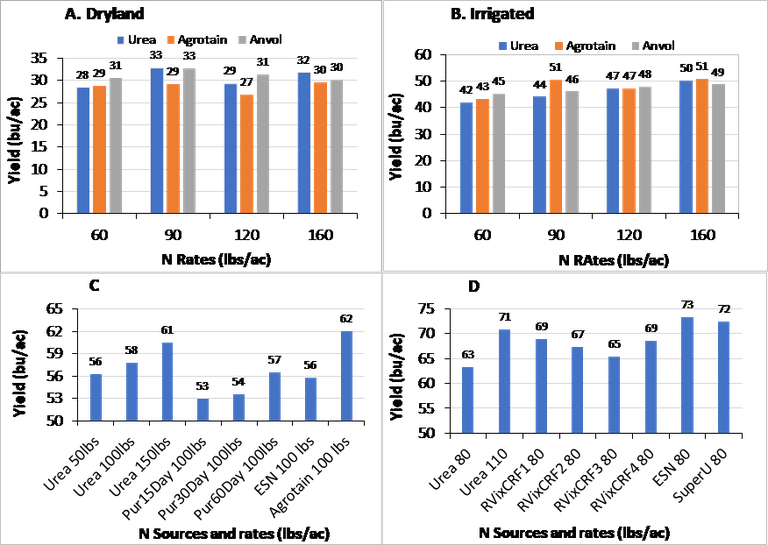How N Stabilizers Impacted Wheat Yields at Carrington in 2020
Nitrogen (N) stabilizers prevent loss of N from N-based fertilizers. Because they are more expensive than plain urea or UAN (28%), their use for crop production should be limited to conditions where the fertilizer application on soil surface will likely result in N loss (e.g. wet soils).
Four field trials were conducted at Carrington to examine the effect on wheat yields of some newly developed slow release N stabilizer formulations (RVix and Pur, which are coded names) that are still undergoing field tests, in comparison with the yields from plain urea and other established N stabilizers like Agrotain, SuperU, and ANVOL.
Urea compared to Agrotain and ANVOL: Fig 1. A and B. Conducted under dryland and irrigated conditions, yields were not significantly impacted by N fertilization. As a result, yields were not different between urea, Agrotain and ANVOL at any of the four N rates (60, 90, 120, and 160 lbs/ac).
Urea compared to Pur (15, 30, 60), ESN and Agrotain: Fig 1. C. Even though yields improved from N application; however, yields were not significantly different between N sources.
Urea compared to RVix, ESN and SuperU: Fig 1. D. Yields were again not different between tested N stabilizer formulations and urea.
 Wheat yield response to urea N compared to N stabilizers (urease inhibitors) under dryland (A) and irrigation (B), and compared to slow release N fertilizers, C and D.
Wheat yield response to urea N compared to N stabilizers (urease inhibitors) under dryland (A) and irrigation (B), and compared to slow release N fertilizers, C and D.
Conclusion
Nitrogen stabilizers did not provide any real yield benefits following their application to spring wheat. Even though a few of these products are proven to be efficient at reducing N losses, any yield gain, or any yield loss prevention that may result from N stabilizer use must important enough to justify their use. Farmers should avoid buying new products without the scientific data to support the results.
Remember to only buy and use N stabilizers for what it is proven to do, to protect N loss, and to be applied when it is most needed.
Previous article on N stabilizers at https://www.ag.ndsu.edu/carringtonrec/center-points/some-things-to-know-if-you-are-planning-to-use-nitrogen-stabilizers
Jasper Teboh, Ph. D.
Jasper.Teboh@ndsu.edu
Soil Scientist


